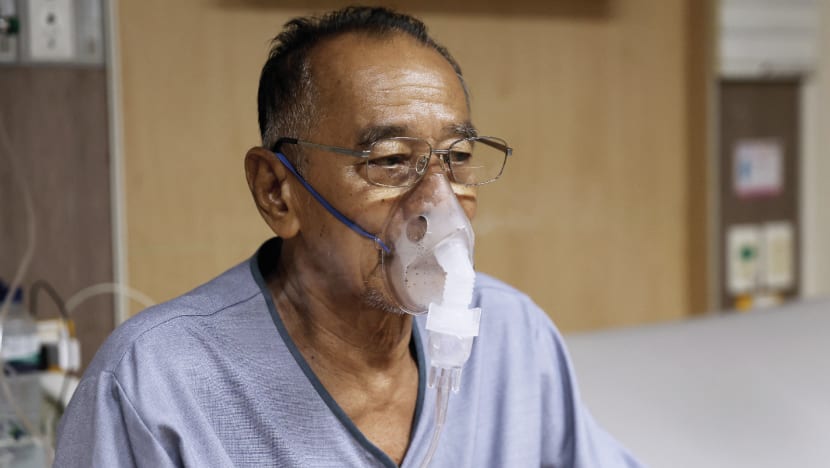Airing the unknown impact of RSV
Often mistaken for a common cold, respiratory syncytial virus poses a serious risk to people above 60 and adults living with certain underlying conditions.

Severe RSV can have serious consequences, significantly impacting the quality of life in older adults. Photos: GSK

This audio is generated by an AI tool.
In Singapore’s humid climate, where respiratory illnesses can spread year-round, respiratory syncytial virus (RSV) is emerging as a stealthy and significant threat.
RSV is a highly contagious virus that affects people of all ages, from infants to adults. Its symptoms often mimic those of influenza or COVID-19, making it hard to differentiate between these illnesses. They include fever, dry cough, sore throat, congested nose and, in severe cases, rapid or difficult breathing. However, one key difference is that RSV frequently causes wheezing, which is less common in the other two illnesses.
Dr Ronald Grossman, a professor of medicine at the University of Toronto and a respiratory infections expert, noted that RSV is commonly associated with infants and young children. However, it can also cause severe illness, complications and even death in adults over 75, those over 60 with conditions like asthma, diabetes, heart disease or chronic obstructive pulmonary disease (COPD), as well as in immunocompromised individuals.
THE GROWING IMPACT OF RSV
As we age, our bodies naturally weaken and become more vulnerable to infections – a process known as immunosenescence. For older adults, this means that RSV isn’t just another respiratory virus, but a disease that can have severe consequences.
In Asia, up to 80 per cent of older adults hospitalised with RSV required supplemental oxygen, and up to 38 per cent needed intensive care‡.
Dr Jim Teo, a respiratory physician and intensivist at Mount Alvernia Hospital and Parkway East Hospital, recounted treating an 80-year-old woman hospitalised for four days with RSV. “She experienced shortness of breath and wheezing. She was surprised by the severity of the disease as she was healthy and had no prior history of asthma. I had to explain that RSV can cause bronchitis and bronchiolitis in both children and older adults†.”
Those with pre-existing conditions like COPD or asthma also have “impaired defence mechanisms in their lungs”, he added, making it easier for the virus to enter airways and cause complications†.

Severe RSV can lead to serious outcomes. Elderly or immunocompromised patients in Singapore face an increased risk of cardiovascular complications such as heart failure and secondary pneumonia. A South Korean team of researchers found that for 87 hospitalised patients diagnosed with RSV, the 20-day mortality rate – defined as the percentage of patients who die within 20 days of hospital admission – reached 18 per cent.
RSV infections can also impair the quality of life in older patients. A study based in the United States showed that older RSV patients are at greater risk of suffering a loss of independence in performing daily tasks such as feeding themselves and getting dressed. “As Singapore’s population ages, more people will be susceptible to RSV due to age-related decline in immunity and accumulating co-morbidities,” Dr Grossman noted.
This demographic shift means that RSV is not just a personal health issue, but an important public health challenge. With a quarter of Singapore’s population expected to be 65 and older by 2030, RSV could place additional pressure on the country’s healthcare system. Nursing and elder homes are particularly at risk due to RSV’s contagious nature, which is spread through contact with infectious respiratory secretions or droplets. The silent transmission of RSV, where some infants and people with weakened immune systems can remain contagious for up to four weeks without showing any symptoms, adds another layer of complexity to controlling its spread.
Dr Lee Tau Hong, an infectious diseases specialist at Mount Elizabeth Hospital, shared a case of an elderly RSV patient, who had to be admitted to intensive care and required a breathing tube and machine assistance. “The damage to the lungs and airways caused by RSV made him vulnerable to bacterial infection, leading to bacterial pneumonia,” he said. “With no specific treatment for RSV, the patient needed weeks of supportive care before recovery†.”

THE POWER OF PREVENTION
RSV is often grouped with “influenza-like illnesses” due to the lack of specific antiviral therapies or diagnostic tests, according to Dr Grossman. “No country routinely surveys their population for RSV, but mislabelling it can lead to unnecessary use of influenza antiviral medications and antibiotics that are ineffective against RSV, resulting in increased bacterial resistance and side effects,” he explained.
Given the limited antiviral treatments against RSV, prevention is crucial. Practising good hygiene, like washing hands regularly, covering your mouth and nose when coughing or sneezing, and disinfecting surfaces, can go a long way in keeping RSV at bay. Additionally, understanding RSV risks and having a conversation with your doctor about vaccinations is vital, especially if you are over 60 and have chronic conditions.
Dr Teo noted that many older patients are unaware of RSV, which contributes to a reluctance to take preventive measures. “They assume it’s not common, so they don’t see the need to protect themselves against it,” he said†.
However, a four-year study in Singapore found that one in 20 adults aged 65 and above tested positive for RSV*. Furthermore, unlike regions with seasonal outbreaks, Singapore faces year-round infections, partly due to its status as a transport hub, said Dr Lee. “Travellers and returning locals may bring back RSV infections, increasing the risk of community spread.”

Caregivers, especially grandparents who are in close contact with young children, are also at risk. The close contact involved in daily caregiving – such as hugging, playing and feeding – can easily transfer the virus from an infected child to an adult.
Dr Grossman emphasises that preventing RSV is easier than treating it. He urges those with respiratory infections to stay home and wear masks in public. “Minimising the spread not only reduces acute infections, but also decreases the likelihood of hospitalisation or complications like pneumonia or heart attacks, easing the burden on the healthcare system. Prevention of RSV in older adults is key,” he said†.
If you are over 60 and have chronic conditions, speak to your doctor about respiratory syncytial virus and how to prevent it.
This health message is intended for audiences in Singapore only and is meant for disease awareness and educational purposes. It does not endorse, make reference to and/or recommend any product. Speak to your healthcare professional to learn more about treatment options and prevention methods. Information in this article is valid as of Sep 20, 2024.
For reporting of adverse events, write to sg.drugsafety [at] gsk.com. © 2024 GSK group of companies or its licensor. NP-SG-RSA-ADVR-240003 September 2024
*From 2014-2018: No. of RSV detections: 23; No. of specimens tested: 435 (5.3%)
†Based on doctor’s clinical experience
‡Supplemental oxygen therapy: N=54; Intensive care: N=29















